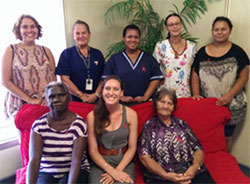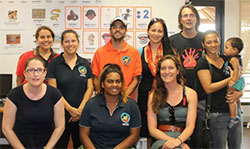Reconciliation and responding to HIV in remote Western Australia
Reconciliation and responding to HIV in remote Western Australia
HIV Australia | Vol. 13 No. 3 | December 2015
By Lisa Tomney and Andrew Burry
When launching our Reconciliation Action Plan two years ago and setting out on our personal and organisational reconciliation journey, we didn’t fundamentally change our commitment to serving Aboriginal and Torres Strait Islander communities.
Such communities are identified as priority populations in all of our contracts and reflect in all of the State and National Strategies we are aligned with. What reconciliation is doing for us, however, is changing our perspective on how and why we work with community.
 For decades we have been concerned about whether our services are culturally secure and appropriate. As contractually required by government, we report every six months on the numbers of Aboriginal and Torres Strait Islanders accessing our suite of services.
For decades we have been concerned about whether our services are culturally secure and appropriate. As contractually required by government, we report every six months on the numbers of Aboriginal and Torres Strait Islanders accessing our suite of services.
Where we can, we report on service outcomes, suggesting ways they can be improved, and on emerging issues and challenges.
What could be clearly seen is that our services experience a wide disparity in Aboriginal use.
Where 40% of clients using our fixed Fremantle Needle Syringe Exchange Program (NSEP) are of Aboriginal or Torres Strait Islander descent, at M Clinic (a service providing sexual health screening services for gay and other homosexually active men) just four out of 3,500 registered clients report Aboriginality (0.11%).
It would be easy to conclude, of course, that NSEP provides a culturally secure service whereas M Clinic does not. But reconciliation tells us that this is not a helpful or accurate conclusion to come to.
Because, what the principles of reconciliation and substantive equality should be reminding us, is that Aboriginal and Torres Strait Islander gay men have exactly the same right to access a free, convenient and appropriate sexual health screening service as every other gay or homosexually active man.
So the challenge is not to try and make M Clinic ‘a bit more Aboriginal’, but to engage with Aboriginal and Torres Strait Islander communities and learn what a sexual health screening service that is comfortable and secure for the community to use would look like.
Then, we can see whether M Clinic can fulfil that role, and if it can’t then we must find a way to develop a service that does. This is what reconciliation is telling us, and it applies to everything we do.
The tyranny of distance
Western Australia is Perth-centric and the WA AIDS Council is a Perth-centric organisation. Nonetheless, we recognise and welcome a social and community responsibility to provide equitable access to everything we offer for all Western Australians.
We have a long and proud history of working in support of Aboriginal and Torres Strait Islander people living with and/or affected by HIV, as well as in delivering culturally secure prevention support to metropolitan, rural and remote communities.
Covering an area of 2.646 million km² presents obvious geographical and cost challenges. From Perth to Broome, for example, is a quick 24 hours by road (2,239 km) or two and a half hours by air.
The so-called tyranny of distance makes the development of partnerships crucial and we have over the years built and fostered relationships with Aboriginal Health Agencies, community organisations and Population Health units, and these have enabled successful working relationships that ensured delivery of support and education where most needed, some of the time.
A welcome outcome of this approach is that of the 68 Aboriginal and Torres Strait Islander people living with HIV in Western Australia, 40 have a varying degree of engagement with our organisation and services.
In terms of ongoing programmatic responses, we are investing heavily in time and energy in some specific areas of activity; one of which is ‘SHAPE’.
Supporting Health and Personal Empowerment (SHAPE)
In 2012, our outreach capacity and ability to intensively engage with our clients was boosted with the successful implementation of the SHAPE Outreach Program.
The SHAPE team work within a model that embraces substantive equality and flexibility, allowing ongoing review and adjustment that supports better health, well-being and outcomes for our client group.
Our team focuses on building relationships with our Aboriginal and Torres Strait Islander clients at their own pace, in an environment which is safe, supportive, culturally appropriate and with an approach that develops trust and self-directed engagement.
Feedback from clinicians indicates that SHAPE has assisted significantly in supporting clients to remain linked with health services, achieve adherence with HIV medication, and receive additional referral to appropriate health and wellbeing services.
The SHAPE team works beside clients to ensure all presenting issues can be considered as part of a comprehensive support plan, including secure and affordable housing, financial security, inter-agency advocacy, family support and addressing social isolation.
Although SHAPE is Perth-based, it works together with our other support worker teams with clients from the far corners of our jurisdiction, who are frequently obliged to come to Perth as the only possible site of effective specialist medical attention.
World AIDS Awareness Week in the Kimberley
During December 2014, our Positive Peer Educator (Liz Walker), was invited by Kimberley Aboriginal Medical Services Ltd (KAMS) to provide HIV education and a personal perspective to communities in Broome, Kununurra and Wyndham.

community health workers and community
leaders in the Kimberley region,
Western Australia, November 2014.
Liz was accompanied by our Aboriginal and Torres Strait Islander Health Promotion Officer (Dennis Beros). Presentations were provided to Broome Senior High School, Kununurra District High School, Save the Children girls group, Broome, Kununurra and Wyndham Hospitals, KAMS, Yawuru Community Group and Wyndham work camp.
During the five-day tour over 200 youth, 80 medical and allied health professionals, and 35 community members were engaged, and we conducted five radio interviews, one online article, tweets and Facebook updates.
All presentations were met with great enthusiasm, suggesting that there is genuine thirst for face-to face support to supplement that provided electronically and by telephone.
Conversations amongst participants identified barriers for clinicians in offering testing, pre- and post-test discussions, issues around contact tracing in the region, and practical measures that will support people living with HIV in rural and remote communities.
It was also possible to begin to understand the communities’ readiness to address issues around sexual health.
Sustainability
Whilst our initiatives have demonstrated at times outstanding outcomes – and certainly great promise – there remains a concern about their level of sustainability given their dependence on patchy and insecure funding.
As an organisation built by and living on the principles of the Ottawa Charter for Health Promotion, we recognise that lasting change comes only when capacity within communities is developed and individuals within those communities have a sufficient level of empowerment to enable them to respond directly and safely to their own health needs; better still, to be enabled to insist on the kinds of services that are most relevant and helpful.
Far too absent in the planning and implementation of programs across our state are the voices, thoughts, ideas and insights of Aboriginal and Torres Strait Islander people. Until we find a way to listen more closely, learn more carefully, and work more sensitively, we will not deliver equitable access to services most needed. Our reconciliation journey keeps telling us this.
Lisa Tomney is the Manager, Clinical Services at the WA AIDS Council.
Andrew Burry is the Chief Executive Officer of the WA AIDS Council.

